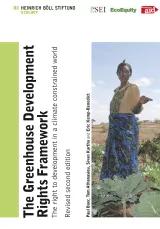The Greenhouse Development Rights Framework
Archived | Content is no longer being updated
Imagine a world in which both the scandal of global poverty and the threat of climate change were taken seriously. In such a world, what action would be required to reduce the atmospheric concentration of greenhouse gases and hold global warming below 2 degrees Celsius above preindustrial levels while at the same time respecting the right of poor people to dignity, to human development, and to economic opportunity?
So constrained is the global carbon budget – global emissions must peak and start a precipitous decline in the next decade – that it is too late to talk of emissions reductions in Annex I countries alone. It is now necessary to secure significant cuts in emissions in the growing nations of the developing world. And yet, even in the burgeoning Chinese and Indian economies, there is still huge poverty. This is the crux of the current climate impasse.
Christian Aid, the Heinrich Böll Foundation, and the Stockholm Environment Institute are therefore proud to be associated with The Greenhouse Development Rights Framework: The right to development in a climate constrained world because it tackles this issue head on. It argues that while people remain poor, it is unacceptable and unrealistic to expect them to focus their valuable resources on the climate change crisis. And it draws the necessary conclusion – that others who are wealthier and have enjoyed higher levels of emissions already, must take on their fair share of the effort.
